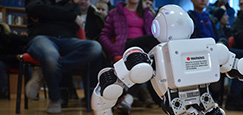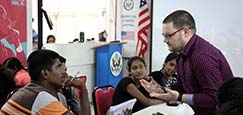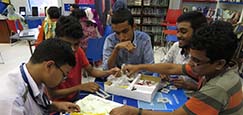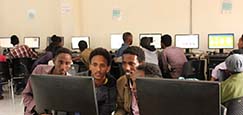- Media Literacy Resource Toolkit
The rise of misinformation and disinformation is worrisome. This toolkit is designed to give you the resources to strengthen American Spaces visitors’ critical thinking and media literacy skills. Work with your Embassy or Consulate in collaboration with local partners, U.S. government exchange alumni, and journalists.
- VOA News Literacy Lessons
In this series on News Literacy developed by VOA Learning English, there are seven videos — an introduction plus six lessons. Each video is four minutes, and each lesson comes with a transcript and key vocabulary used in the story.
- Video and Discussion Guide on Media Literacy (PDF 469 kb)
The featured video for this guide is a 7+ minute PBS News Hour video that reports on how and why schools in Washington State are starting to teach media literacy in their classrooms. This discussion guide provides key vocabulary words, a general media landscape summary, suggested discussion questions, and information for additional media literacy resources and lesson plans.
- "Stop. Reflect. Verify." Videos and Event Facilitation Guide
This media literacy campaign was developed as part of U.S. Department of State’s YALI (Young African Leaders Initiative) Network programs. These programming materials would be suitable for use in American Spaces worldwide. There are three videos, and each video is 2-3 minutes. Transcripts are available in English, French, Portuguese, and Spanish. The Event Facilitation Guide provides suggested discussion questions and group activities.
- Share America "Recognizing Disinformation" Video (2 mins 31 sec)
This video has been translated into Chinese, French, Portuguese, Russian, and Spanish.
- Movie Programming Kit -- Shattered Glass (PDF 217 kb)
- True or False? Assessing the News Program Kit (PDF 708 kb)
- Programming
- Thematic Resources
- Programming Packages
- Planning Your Event/ Program
- Regional Resources
- Managing Your Space
- American Spaces Handbook
- Design Your Space
- American Spaces Standards

Guidelines for the services and programs an American Space should offer, the resources that should be available, and how the American Space should look and feel to a visitor.
- A Modern American Space

A modern American Space is a physical venue for public engagement with foreign target audiences in support of United States foreign policy objectives.
- Training
- In Person Training

The Office of American Spaces offers basic and advanced training courses for those who staff and manage American Spaces.
- Virtual Training

The Office of American Spaces training team is developing self-paced training modules based on the annual central training program for managers and employees of American Spaces around the world.
- Cultural Networks
- About Us
